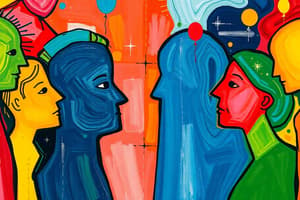Podcast
Questions and Answers
Which family type emphasizes individual freedom and activities?
Which family type emphasizes individual freedom and activities?
- Social aquarium
- Revolving door family (correct)
- Team family
- Patriarchal family
A team family is known for having a strong bond and equal dialogues.
A team family is known for having a strong bond and equal dialogues.
True (A)
What is the inner core of a person's identity referred to as?
What is the inner core of a person's identity referred to as?
I-identity
Collective identity is a combination of __________ identity and __________ identity.
Collective identity is a combination of __________ identity and __________ identity.
Match the following identity types with their descriptions:
Match the following identity types with their descriptions:
What is the main focus of social science?
What is the main focus of social science?
Primary socialisation occurs in environments outside the home.
Primary socialisation occurs in environments outside the home.
Who argues that children are subjects to dual socialisation?
Who argues that children are subjects to dual socialisation?
Socialisation is the process of becoming part of ______.
Socialisation is the process of becoming part of ______.
Match the family types with their characteristics:
Match the family types with their characteristics:
What has changed regarding children's socialisation according to Lars Dencik?
What has changed regarding children's socialisation according to Lars Dencik?
In modern times, multigenerational families are very common.
In modern times, multigenerational families are very common.
The _______ model observes children being affected by various factors in their socialisation.
The _______ model observes children being affected by various factors in their socialisation.
Study Notes
Social Science
- Investigates and addresses social, political, and economic events.
- Explores how human beings interact and organize themselves within societies.
Social Norms
- Rules of behavior within society.
- Guide individuals on appropriate actions and interactions.
Socialization
- Process of becoming a member of society.
- Learning essential values, norms, and manners.
Primary Socialization
- Takes place in the immediate surroundings (parents, siblings, close friends).
- Fosters the transition from biological being to a social one.
Secondary Socialization
- Occurs outside the home (daycare, school, hobbies).
- Continues the process of adopting norms and values.
Dual Socialization
- Combines primary and secondary socialization.
- Individuals learn to adapt to different social situations and act accordingly.
Nuclear Family
- Strongly bonded unit with defined norms and values.
- Traditional gender roles are changing.
Multigenerational Family
- Includes grandparents, parents, and siblings.
- Less common nowadays for generations to live together.
Lars Dencik's Argument on Dual Socialization
- Children early in life experience different norms in primary and secondary education.
- Caused by increased women's participation in work and earlier daycare enrollment.
- Positive impact: encourages independent choices and flexibility.
- Criticism: Could lead to early separation from a secure home environment.
Socialization Arenas
- Socially defined spaces with specific norms and values.
- Examples: family, school, work, peer groups.
Multi-Socialization Model
- Individuals are influenced by numerous factors beyond primary and secondary socialization.
- Includes the impact of other children, daycare, computer games, movies, and television.
Family Types
- Social aquarium (modern and weak): Family members spend time together but engage in separate activities.
- Revolving door family (modern and weak): Emphasis on individual freedom and activities.
- Patriarchal family (traditional and strong): Traditional values and conservative norms with strong bonds.
- Team family (modern and strong): Democratic, equal dialogue, and agreements.
Person's Identity
- A social and individual project.
I-Identity
- Inner core, sense of self.
- Stable sense of identity despite changes in social behavior.
- Shaped by genetics/heritage and personal experiences.
Personal Identity
- Consciously chosen presentation of self to others.
- Can evolve throughout life.
Social Identity
- Adapts to the environment.
- Reflects an understanding of how others perceive us.
- Shapes behavior accordingly.
- It is our IMAGE.
Collective Identity (What am I and who do I belong to?)
- Combination of personal and social identity.
- Influenced by the surrounding environment.
I and ME
- I: Spontaneous, "unsocialized" self.
- ME: Socially influenced self, living up to expectations.
Studying That Suits You
Use AI to generate personalized quizzes and flashcards to suit your learning preferences.
Related Documents
Description
This quiz explores key concepts in social science, including social norms, the process of socialization, and the distinctions between primary and secondary socialization. Understand how individuals interact within different family structures and the evolution of gender roles in society.




